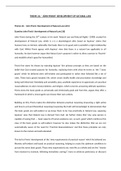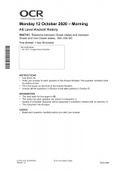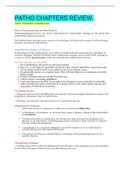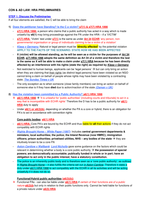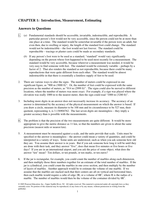THE ROLE OF KNOWLEDGE AND CONVIVIAL ENCOUNTERS IN PUBLIC ATTITUDE TOWARD PWID
The role of Knowledge and Convivial Encounters in Public Attitude toward People with
Intellectual Disability
Naam student :
Studentnummer :
Cursusnaam : PB9906 Bachelorthesis
Begeleider :
Examinator :
Inleverdatum : 21-12-2022
,CONVIVIAL ENCOUNTERS AND KNOWLEDGE PREDICTING ATTITUDE TOWARD PWID 2
Abstract
People with an intellectual disability experience less quality of life caused by challenges in
participation and social inclusion in society. Public attitudes seem to have a large contribution to this.
Knowledge and contact are important factors associated with the behavioral component of public
attitude. This study examined the role of knowledge and convivial encounters on the behavioral
component, in this study referred to as “willingness to interact” with people with an intellectual
disability. As personality factors openness and agreeableness influence the effect of encounters on
willingness to interact, these factors were taken into account as moderators. Data was obtained
through a questionnaire. Multiple regression analysis and moderation analysis were performed on a
sample of 306 respondents to assess the association between both knowledge of intellectual disability
and convivial encounter with the willingness to interact. The results of the study show that knowledge
of causes of intellectual disability and knowledge of capacities and rights of people with an
intellectual disability, significantly seemed to predict the willingness to interact with these people.
Higher levels of knowledge of causes of intellectual disability and higher levels of knowledge of
capacities and rights of people with an intellectual disability are associated with higher levels of
willingness to interact. An association between convivial encounters and willingness to interact was
not found. Openness and agreeableness in itself were found to be important factors that influence the
willingness to interact. Further investigation is needed to provide information on what kind of contact
and what quantity of contact is associated with the willingness to interact. Also more information is
needed regarding the association of openness and agreeableness with the willingness to interact.
Introduction
In the Netherlands, people with intellectual disabilities have the same rights as the general
population (United Nations, 2006; Wetten.nl, 2016). Yet people with intellectual disabilities find it
increasingly difficult to participate in society. In the Netherlands there are 68.000 people with a severe
intellectual disability (IQ < 50) and 74.000 people with a mild intellectual disability (IQ between 50-
70). Thus a total of 142.000 people (Vereniging Gehandicaptenzorg Nederland, 2019).
,CONVIVIAL ENCOUNTERS AND KNOWLEDGE PREDICTING ATTITUDE TOWARD PWID 3
People with intellectual disabilities in the Netherlands encounter all kind of barriers that
hamper them to participate in society (WHO, 2011). They experience discrimination and various
problems regarding participation and inclusion in everyday life. They report inequality in accessing
health care, employment, education, leisure activities, and finances (Pelleboer-Gunnink, 2020). This
causes them to participate less in society, experience more loneliness and feeling less satisfied with
their lives (Sociaal Cultureel Planbureau, 2020). People with intellectual disabilities report social
inclusion and contributing to society as important factors for having a good and satisfactory life (Elks,
2020). They point out that having some choice and independence, having lots to do and having social
roles which are valued by themselves and others, make life fulfilling (Haigh et al., 2013). It is
suggested that public attitude toward people with an intellectual disability is an important factor that
affects participation and integration and thus hinder them in achieving happiness and a fulfilling life
(Findler, Vilchinsky & Werner, 2007; Verdonschot et al., 2009; Scior, 2011).
The cause of difficulties with participation seems to be the increasing complexity of our
society and the increasing demands placed on the functioning of people (Eggink, Woittiez, de Klerk
2020). In addition, this group continues to have a low priority with governments and they are poorly
represented in organisations that defend their rights (Scior et al., 2016). Despite political efforts to
better integrate people with intellectual disabilities into our society, they still experience social
inclusion challenges due to their intellectual disabilities and limited adaptability. As a result, they
experience a lower well-being due to problems with giving meaning to a valuable life (Scior et al.,
2016; Scior & Werner, 2016).
The World Health Organization (WHO) acknowledges that people with intellectual
disabilities experience barriers to social inclusion and participation in our society (WHO, 2011).
These experiences seem to be caused by stigmatization of people with an intellectual disability (Scior
et al., 2016, 2020). Stigma refers to stereotyping people by negatively labeling them, having prejudice
and discriminate them (Link & Phelan, 2001). When the general public holds negative cognitions and
emotions resulting in discriminant behavior, this is referred to as public stigma (Corrigan & Watson,
2002; Scior, 2011; Scior et al., 2020). This study focusses on public stigma.
, CONVIVIAL ENCOUNTERS AND KNOWLEDGE PREDICTING ATTITUDE TOWARD PWID 4
Knowledge of intellectual disability and contact with people with an intellectual disability
seem to influence attitudes toward people with an intellectual disability (Scior, 2011; Seewooruttun &
Scior, 2014; Blundell at el., 2016; Wang et al., 2021). Contact in the form of convivial encounters has
been the focus of a few recent studies (Wiesel & Bigby, 2014, 2016; Bredewold et al., 2020; Bigby &
Anderson, 2021). Convivial encounters, according to Fincher and Iveson (2008), are friendly and
welcoming encounters between strangers and can contribute to improved attitudes (Bigby &
Anderson, 2021). Yet, more insight is necessary in the relationship between convivial encounters and
public attitude. Therefore, the current research aims to provide insight into the influence of knowledge
and convivial encounters on attitude, in particular, on the willingness to interact with people with an
intellectual disability. As a persons personality is related to contact and influences situation selection
and social interaction as well as the possibility to see opportunities to engage with other people or
situations (Rauthmann et al., 2015) this factor is therefore taken into account in the current study.
Intellectual disability and public attitude
According to the American Psychiatric Association’s Dictionary of Psychology (2015),
intellectual disability is also called an “intellectual developmental disorder” and is defined as; “a
developmental disability characterized by mild to profound limitations in cognitive function (e.g.
learning, problem solving, reasoning, planning) and in adaptive behavior, impairing one’s ability to
acquire skills typical for one’s age group as a child or necessary for one’s later independent
functioning as an adult”. According to DSM-5, the diagnosis of intellectual disability can be made if
three criteria are met; “deficits in intellectual functions”, “deficits in adaptive functioning” and “onset
of intellectual and adaptive deficits during the developmental period” (APA Psychiatric Association,
2013).
Allport defined attitude as “a mental and neural state of readiness, organized through
experience, exerting a directive and dynamic influence upon the individuals response to all objects
and situations with which it is related” (Allport, 1935). Over the following decades the concept of
attitude was subject of many studies and the initial definitions included cognitive, motivational,
behavioral and affective components (Schwarz & Bohner, 2001). More recent studies acknowledge



